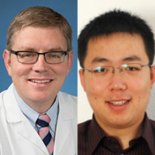Featured Speaker:
Huan Meng, PhD & Timothy Donahue, MD, PhD
 Dr. Huan Meng
Dr. Huan Meng is an Adjunct Assistant Professor, Department of Medicine, NanoMedicine/Member, JCCC Cancer Nanotechnology Program.
Dr. Meng’s research mainly focuses on nanomedicine and nanobiology. Dr. Meng has a broad background in pharmaceutical science and nanochemistry, with intensive experiences in cancer nanotherapy. This includes the safe design of multifunctional nanotherapeutic systems, such as mesoporous silica nanoparticles, carbonaceous nanoplatforms and liposomes for delivery/therapy/diagnosis purposes in various cancer types (e.g., breast, cervical and pancreatic cancer). He and his colleagues have developed a list of biologically functional particle design features that could successfully improve the utility of the nanotherapeutic platforms by controlling particle size, colloidal stability, charge, surface modification and aspect ratio, as well as on-demand release profile via nanovalves. Dr. Meng is also involved in the development of novel nanomedicine in infection disease.
Equally important, Dr. Meng works for the Center for Environmental Implications of Nanotechnology (CEIN) at UCLA. In CEIN, he studies the safety of engineered nanomaterials and nanobiology. Dr. Meng has successfully leveraged the knowledge in nanosafety projects to design safe nanomedicine for therapeutic purposes. In the collaboration with UCLA clinical oncologists, the long-term goal of Meng’s research is to move his platforms into the next stage of development (i.e., nanomedicine clinical trials).
 Dr. Timothy Donahue
Dr. Timothy Donahue is an Associate Professor of Surgery at the David Geffen School of Medicine at UCLA. He also has a joint appointment in the Department of Molecular and Medical Pharmacology to facilitate his research program. Dr. Donahue is the Chief of Pancreatic Surgery and oversees the pancreatic diseases multi-disciplinary program at UCLA. It is one of the largest in the nation.
Dr. Donahue is a very busy pancreatic surgeon. He performs three to four pancreatic surgeries per week. He is genuinely interested in caring for patients with pancreatic cancer. His clinical research is focused on improving the care of patients with borderline resectable or locally advanced disease. Dr. Donahue is a strong advocate of prolonged preoperative chemo- or radiation therapy for this group of patients to optimally select for those who will benefit from a surgical resection. As a result of this approach, Dr. Donahue and his team have among the best reported survival rates reported in the world.
In addition to his clinical work, Dr. Donahue is the Principal Investigator of a National Institutes of Health funded research laboratory. His scientific research focuses on developing improved treatment strategies and earlier diagnostic markers for patients with pancreatic cancer. He collaborates closely with other scientists across the UCLA campus, including faculty in the Ahmanson Translational Imaging Division and California Nanosystems Institute. He is optimistic that therapy for pancreatic cancer will markedly improve during his career.
After graduating from college and medical school at Northwestern University, Dr. Donahue completed his surgical and research training at UCLA. He has been on the faculty and in his current role since 2009. He resides in the Pacific Palisades with his wife and three children.



 Dr. Huan Meng is an Adjunct Assistant Professor, Department of Medicine, NanoMedicine/Member, JCCC Cancer Nanotechnology Program.
Dr. Huan Meng is an Adjunct Assistant Professor, Department of Medicine, NanoMedicine/Member, JCCC Cancer Nanotechnology Program. Dr. Timothy Donahue is an Associate Professor of Surgery at the David Geffen School of Medicine at UCLA. He also has a joint appointment in the Department of Molecular and Medical Pharmacology to facilitate his research program. Dr. Donahue is the Chief of Pancreatic Surgery and oversees the pancreatic diseases multi-disciplinary program at UCLA. It is one of the largest in the nation.
Dr. Timothy Donahue is an Associate Professor of Surgery at the David Geffen School of Medicine at UCLA. He also has a joint appointment in the Department of Molecular and Medical Pharmacology to facilitate his research program. Dr. Donahue is the Chief of Pancreatic Surgery and oversees the pancreatic diseases multi-disciplinary program at UCLA. It is one of the largest in the nation.